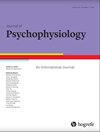睡眠和日常积极情绪——心率变异是一个中介因素吗?
IF 0.9
4区 心理学
Q4 NEUROSCIENCES
引用次数: 0
摘要
摘要睡眠质量被认为是情绪健康的一个基本方面。睡眠质量和积极情绪之间联系的心理生理机制在很大程度上仍然未知,但自主调节可能发挥作用。这项研究对年轻人样本采用了为期两天的生态瞬时评估方法,以调查早上报告的主观睡眠质量是否与日常积极情绪体验有关,以及这种联系是否由心率变异性(HRV)介导,心率变异性是衡量心脏迷走神经张力的一种指标。醒来后使用电子睡眠日记评估睡眠质量,同时分别使用光电体积描记术和电子日记在一天中随机检查静息HRV和积极情绪。还评估了每次测量之间的相关混杂变量,如吸烟、饮酒和体育锻炼。该样本包括121名参与者(64.8%的女性,Mage=25.97±5.32岁)。在控制了包括健康行为和精神合并症在内的相关混杂因素后,中介分析显示,更高的睡眠质量可以积极预测每日HRV(β=.289,p<.001),而这反过来又对积极情绪产生了直接影响(β=.244,p=.006)。此外,睡眠质量直接预测积极情绪体验(β=0.272,p=0.001)。最后,该模型通过HRV显示了睡眠质量与积极情绪之间的间接影响(β=0.071,95%脑机接口[0.011,.146])。结果支持HRV作为将睡眠与积极情绪联系起来的过程变量的观点。需要实验数据来巩固目前的发现。本文章由计算机程序翻译,如有差异,请以英文原文为准。
Sleep and Daily Positive Emotions – Is Heart Rate Variability a Mediator?
Abstract. Sleep quality is considered a basic dimension of emotional health. The psychophysiological mechanisms underlying the associations between sleep quality and positive emotions are still largely unknown, yet autonomic regulation may play a role. This study employed a two-day ecological momentary assessment methodology in a sample of young adults to investigate whether subjective sleep quality reported in the morning was associated with daily positive emotional experience and whether this association was mediated by heart rate variability (HRV), a measure of cardiac vagal tone. Sleep quality was assessed using an electronic sleep diary upon awakening, while resting HRV and positive emotions were inspected at random times throughout the day using photoplethysmography and an electronic diary, respectively. Relevant confounding variables such as smoking, alcohol intake, and physical exercise between each measurement were also assessed. The sample included 121 participants (64.8% females, Mage = 25.97 ± 5.32 years). After controlling for relevant confounders including health behaviors and psychiatric comorbidities, mediation analysis revealed that greater sleep quality positively predicted daily HRV (β = .289, p < .001) which, in turn, had a direct influence on positive emotions (β = .244, p = .006). Also, sleep quality directly predicted positive emotional experience (β = .272, p = .001). Lastly, the model showed an indirect effect between sleep quality and positive emotions via HRV (β = .071, 95% BCI [.011, .146]). Results support the view of HRV as a process variable linking sleep to positive emotions. Experimental data is needed to consolidate the present findings.
求助全文
通过发布文献求助,成功后即可免费获取论文全文。
去求助
来源期刊

Journal of Psychophysiology
医学-神经科学
CiteScore
2.60
自引率
7.70%
发文量
25
审稿时长
>12 weeks
期刊介绍:
The Journal of Psychophysiology is an international periodical that presents original research in all fields employing psychophysiological measures on human subjects. Contributions are published from psychology, physiology, clinical psychology, psychiatry, neurosciences, and pharmacology. Communications on new psychophysiological methods are presented as well. Space is also allocated for letters to the editor and book reviews. Occasional special issues are devoted to important current issues in psychophysiology.
 求助内容:
求助内容: 应助结果提醒方式:
应助结果提醒方式:


